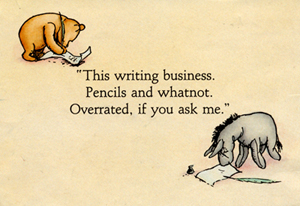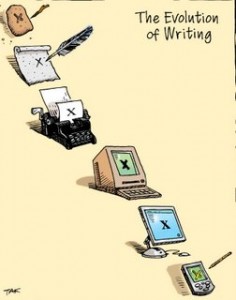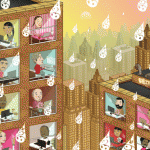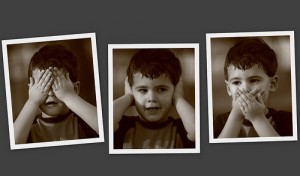A computer cannot replicate a library. The gradual digitization of our society has had profound implications on methods for collecting and preserving writing. A debate currently surrounds the usage of digital methods for storing and retrieving information. While there are positives to digitalizing human knowledge, specifically writing, it is crucial to recognize the many obstacles if there is any expectation of merging written work with the technological world. Thus, the virtual library, without addressing the shortcomings, may be too good to be true. Major legal issues also arise with the attempt at a virtual library. Copy write laws, orphaned books, and Google’s role become major points of contention which to some may seem unethical. It does not have to be black and white. A fusion of technology and written documents is being forged by groups such as the UBC InterPARES project and the Turning the Pages 2.0 toolkit. The digital age and digitization of the written word will have extensive implications for future generations. Our decisions about how to manage the digital written word will set the stage for generations to come. These challenges must be faced to ensure that our past does not become a blank spot in history.
Kevin Kelly’s article, Scrap This Book, focuses on mainly the advantages to a virtual library. According to him, this library will essentially be “one big book of humanity” that encompasses all written documents in human history. As Kelly suggests, there are numerous advantages for all written works to be digital and freely accessed. Scrap This Book indicates that online versions of written work will be more accessible to other cultures that have had little access to information in the past. The article does not however, indicate if poverty or socioeconomic status could be a hindrance to another cultures access to this new library. Currently more than half of the world’s population does not own a computer, making it quite difficult for accessibility of the digital work. What Kelly does emphasize is that the universal library will “deepen our understanding of history, as every original document in the course of civilization is scanned and cross-linked”[1]. The cross-linking of information would be advantageous as “every bit informs another; every page reads all the other pages”[2] The book would resemble the popular information site Wikipedia. The ability to find information, access relatable material, and look up confusing points could foster a better understanding of information.
Furthermore, libraries could benefit from the digitization of written material. Libraries could increase their collections by buying digital books. These online versions would be more cost effective consequently increasing what they can offer the public. Kelly paints a beautiful scene, but there are critics who have reservations about the sole reliance on digital means. These critics maintain that the virtual library maybe over simplified and as a result, unrealistic.
James J. O’Donnell suggests in his article, An Idea Whose Time has Passed, that the digitization of books and the virtual library are “as fresh as last week’s newspaper”[3]. In fact, his article frequently refers to the virtual library as a “fantasy” or “dream”. O’Donnell opposes the view of Kelly indicating that the imperfections of the online virtual library must be acknowledged. O’Donnell questions what information should be included in a digital library, for example, if emails, notes, or shopping lists should be included. It is difficult to decipher what constitutes written work and who would indicate it as such. In this great book of humanity, a question emerges: whose responsibility would it be to moderate the content? Moreover, would classified military documents be included even though it could be a threat the security of that country? It is also apparent that the issue of young children would need to be addressed. As a free and interactive space, should children have access to all parts of the library? Our morals should dictate that the digital library blocks access to adult themes, which does not seem possible unless somehow people prove their age. Yet blocks could have the potential to alter the fundamental principle of the digital library which presumes to be “truly democratic, offering every book to every person”[4].
Another concern is in regards to the Wiki format of the digital library. With a Wiki format, creative works can be “linked, manipulated, annotated, tagged, highlighted, translated, enlivened by other media and sewn together into the universal library”[5]. O’Donnell broaches a concern for this format stating that classic works should not be modified. The moral implication being we should avoid making changes or have the ability to edit the only copies of great works in literature. It would be as if an attempt was being made to alter history. It would be a disservice to history to change it to suit the current generations’ purposes.
There are other fundamental issues in regards to the virtual library. The digital world is currently fragile and still experiences issues in which data can be lost. In Avatars of the Word, O’Donnell makes a striking point in regards to the digital world’s vulnerability:
“We will no longer be able to depend on survival of information through benign neglect. There are medieval manuscript books that may have lain unread for hundreds of years, but offered their treasures to the first reader who found and tried them. An electronic text subjected to the same degree of neglect is unlikely to survive five years.”[6]
The apprehension felt by many is that the reliance on digital will be a gamble of sorts putting us in the position to loose data due to neglect, outdated software, and computer glitches. Conversely, the written word is more permeable despite change or abandonment. In a 2006 article written for Popular Mechanics, corroborates O’Donnell’s unease on the exclusive reliance of digital work. The article, The Digital Ice Age, identifies that many of our software programs that store information are at risk:
“the threat of lost or corrupted data faces anyone who relies on digital media to store documents – and these days, that’s practically everyone. Digital information is so simple to create and store, we naturally think it will be easily and accurately preserved for the future. Nothing could be further from the truth. In fact, our digital information – everything from photos of loved ones to diagrams of Navy ships – is at risk of degrading, becoming unreadable or disappearing altogether”[7]
` The article implies that backwards compatibility is a legitimate concern and evidence exists to confirm these suspicions. The Doomsday book project from 1986 provides a troublesome look into the future. William the Conqueror’s Doomsday book, written in 1086, was compiled into an interactive program where more than a million people submitted documents, photos, and thoughts. Fifteen years later the disks used to compile the work were corrupted due to compatibility issues with the newer systems. Examples such as the multimedia Doomsday book project confirm that the digitization of all written work is fraught with challenge. The realization is that backups, constant care, and updating would be required to maintain the digital library’s functionality.
The business of storage can promote its own problems. There are numerous ethical implications and copy write issues that plague the “dream” of a virtual library. Google is currently scanning vast numbers of books and storing them for future use the digital library. Some suggest, such as Kelly, that Google is simply facilitating the realization of the digital library while at the same time liberating “orphaned” books that are in publisher limbo. Kelly also suggested that the library would be a center for equality and deem the copy write laws obsolete. He considers publishers to be greedy by not sharing their information to the world. The problem with this logic is that Google itself is a business or a company out to make money. It is too simple to believe that Google has purely altruistic motives. Google will receive something from this enterprise, whether that is currently apparent or not.
Who owns what will be a central issue that will have to be addressed as written information becomes digitized and more readily available. Copy write in the future should be clearly presented to ensure credit is provided to those who did the work. Google is not the only company at work on digital projects.
There are several other groups at work forging a middle ground between written work and the digital world. These factions attempt to embrace the digital and technological shifts occurring in our society, while at the same time, maintaining some of the original formatting. A bridge can be made between total digitization and a sole reliance on books. The Rocket eBook is a hybrid of a paper book and digital information. In Writing Space, Computers, Hypertext, and the Remediation of Print, Jay David Bolter suggests the eBook has similar characteristics of a book, such as margin writing and the ability to highlight passages, but also “turns any text into a hypertext in which the reader can search for the occurrence of words and phrases throughout the text, so that the whole text becomes immediately available”[8].
Other initiatives include the Turning the Page toolkit which keeps the appearance of a real book but allows people to have access to the work online. Turning the Page “allows libraries and museums to put entire collections of books online in a compelling 3D environment”[9]. Thus Turning the Page preserves book integrity while enabling people around the world to have access to the documents or written work. In addition to these developments, projects are in progress which address the issue of storage and copy write infringement. The UBC based project InterPARES is attempting to “translate the theory and methods of digital preservation drawn from research to date into concrete action plans for existing bodies of records that are to be kept over the long term by archives ad archival/records units within organization-endowed with limited resources”[10] Essentially, the project creates plans that will facilitate keepers of digital information in the maintenance of records by addressing the issue of backwards compatibility and issues of patent and copy write laws. As stated in the InterPARES overview “Governance, law, art, science and scholarship urgently require concrete plans for the preservation of digital materials so that today’s actions, thoughts, achievements and creations will have a future and the future will have a memory”[11].
Books hold a special place in our culture and society. There is something tactile about reading. Nothing can substitute the feel, texture, and smell of a book. Even history could be altered. Although the advantages of a virtual library are attractive, one must look at the whole picture including the potential problems to comprehend its full potential. Replacing books with all digital material would simply not be feasible. Yet, that does not mean that written material should not be digitized. Instead of one or the other it is possible to embrace both and utilize them to our advantage. As O’Donnell suggests: “Paradoxically this means not asking what computers can do in and four our old institutions; it means asking what needs doing and then looking with a clear unprejudiced eye for the best way of doing it. The answer will often be electronic, but the challenge will be to make sure that what the electrons do is indeed valuable to our society.”[12]
The challenge is to see both sides of the technology. There will always be a place for the pen and paper writing, but it is possible to use the digitization of the written word to enhance not to destroy the other form. Our world is changing and technological innovations will continue to change and shape our understanding. By incorporating both in a hybrid, or symbiotic relationship, more can be achieved without the loss of culture and history.
Works Cited
[1] Kelly, Kevin. “Scan This Book!” The New Yorker 14 May 2006. New York Times. Web. 25 Sept. 2009. http://nytimes.com/2006/05/14/magazine.html
[2] Ibid
[3] O’Donnell, James J. The Virtual Library: An Idea Whose Time Has Passed. University of Pennsylvania. Web. 25 Sept. 2009. www.web.archive.org/web/20070204034556/http://ccat.sas.upen.edu/jod/virtual.html.
[4] Kelly, Kevin. “Scan This Book!” The New Yorker 14 May 2006. New York Times. Web. 25 Sept. 2009. http://nytimes.com/2006/05/14/magazine.html.
[5] Ibid
[6] O’Donnell, James J. Avatars of the World. From Papyrus to Cyberspace. Cambridge, MA: Cambridge, 1998. Web. 25 Sept. 2009. http://www.public.asu.edu/~dgilfill/speakers/odonnell1.html
[7] Reagan, Brad. “The Digital Ice Age.” Popular Mechanics. Dec. 2006. Web. Dec. 2006. www.popularmechanics.com/technology/industry/4201645.html?page=3.com.
[8] Bolter, Jay David. Writing Space: Computers, Hypertext, and the Remediation of Print. New Jersey: Lawrence Erlbaum Associates, 2001. Print.
[9] “Turning the Pages 2.0 – Building the Online Library.” Web. www.turningthepages.com
[10] “InterPares 3 Project – International Research on Permanent Authentic Records in Electronic Systems.” UBC. Web. www.interpares.org
[11] Ibid.
[12] O’Donnell, James J. The Virtual Library: An Idea Whose Time Has Passed. University of Pennsylvania. Web. 25 Sept. 2009.
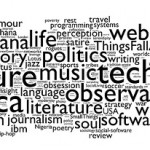 There is a global conflict taking place. That battle occurs not in cities and towns but in the hearts and minds of members of the global community. If this sounds alarmist and hyperbolic it is and encapsulates the sentiments of Neil Postman in his introductory chapter titled, “The Judgement of Thamus” (Postman, 1992). Postman (1992) is of the mind that technology in the form of television and computers are influencing society in general and students specifically in profoundly negative ways. He cautions us that before a technology is readily accepted into a culture the negative aspects of that technology must be considered. He present a very narrow definition of technology. Postman fails to recognize that, “Technologies are not mere exterior aids but also interior transformations of consciousness.” (Ong, 1982, p.81). Postman’s technological deterministic stance is moderated by the work of Ong (1982) and Chandler (1994). To say that consciousness is being fundamentally altered is a stretch but are we being influenced by the shift from a print based culture to a hypertext media? Most likely. What these changes to our consciousness are and to what degree will have academics debating for years.
There is a global conflict taking place. That battle occurs not in cities and towns but in the hearts and minds of members of the global community. If this sounds alarmist and hyperbolic it is and encapsulates the sentiments of Neil Postman in his introductory chapter titled, “The Judgement of Thamus” (Postman, 1992). Postman (1992) is of the mind that technology in the form of television and computers are influencing society in general and students specifically in profoundly negative ways. He cautions us that before a technology is readily accepted into a culture the negative aspects of that technology must be considered. He present a very narrow definition of technology. Postman fails to recognize that, “Technologies are not mere exterior aids but also interior transformations of consciousness.” (Ong, 1982, p.81). Postman’s technological deterministic stance is moderated by the work of Ong (1982) and Chandler (1994). To say that consciousness is being fundamentally altered is a stretch but are we being influenced by the shift from a print based culture to a hypertext media? Most likely. What these changes to our consciousness are and to what degree will have academics debating for years.